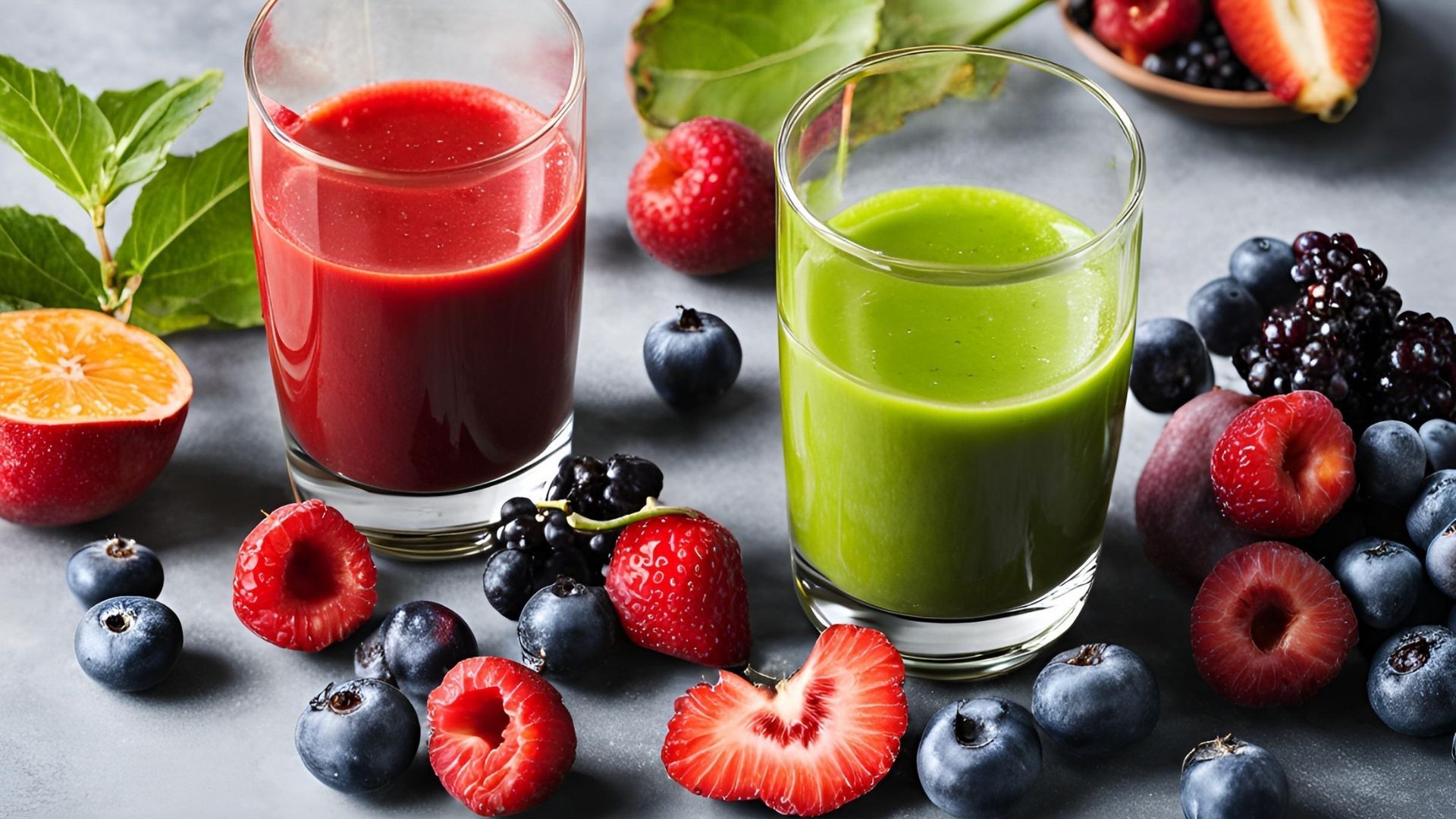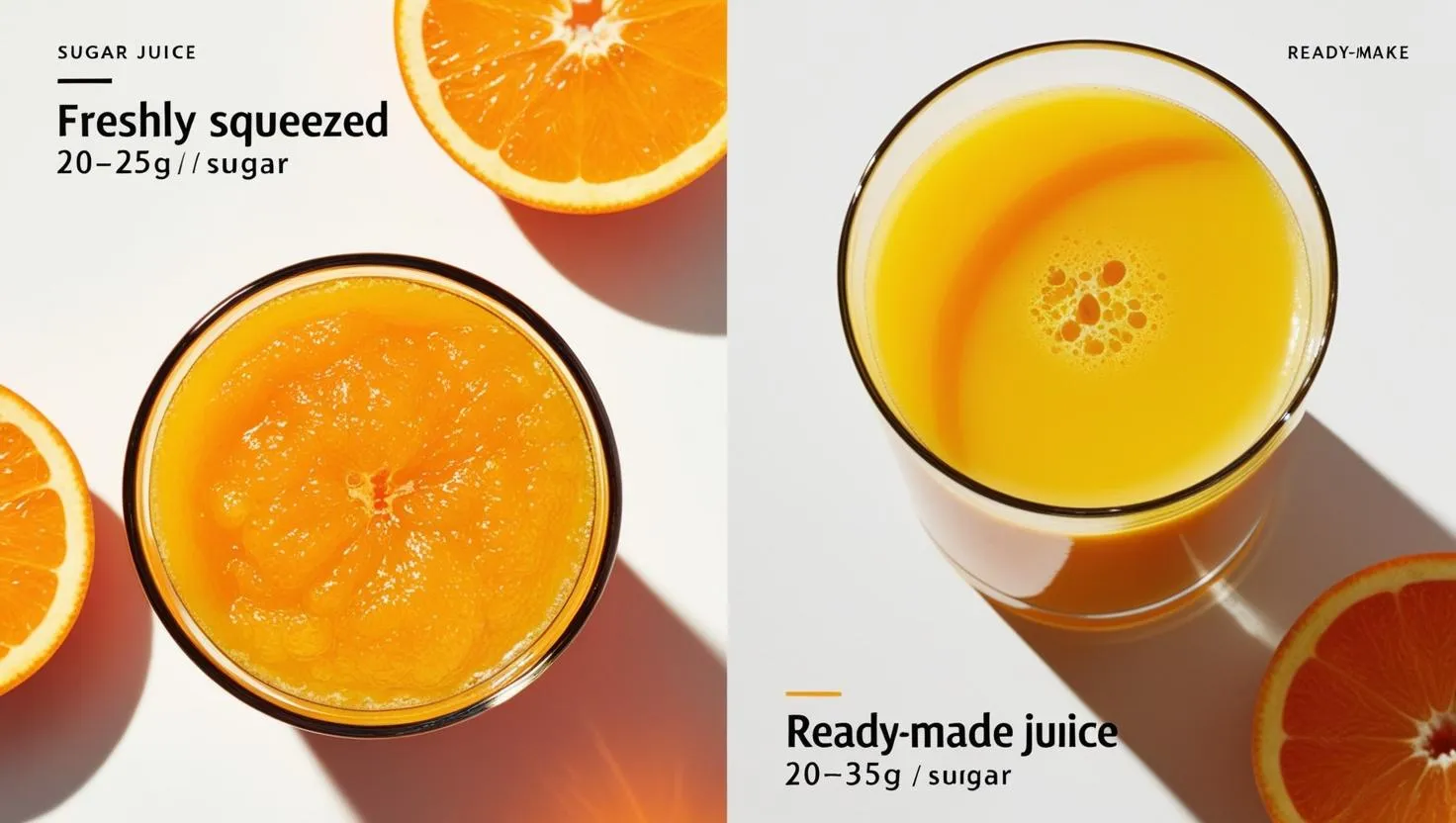Table of Contents
- How Can a Juice Consumption Calculator Help You Manage Your Daily Sugar Intake?
- How Does the Juice Consumption Calculator Work?
- Why Should You Monitor Your Juice Consumption?
- Juice vs. Whole Fruits: A Comparative Analysis
- Tips for Healthy Juice Consumption
- How Much Juice Should I Drink a Day?
- Is Drinking 100% Fruit Juice the Same as Eating Fruit?
- Are Juices Good for Health?
- What Are the Cons of Juicing?
- How to Use the Juice Consumption Calculator Effectively
- Start Your Healthier Journey Today!
Estimated reading time: 5 minutes. Last updated: January 25, 2025.
How Can a Juice Consumption Calculator Help You Manage Your Daily Sugar Intake?
"Juice is delicious, but are you aware of how much sugar you're
consuming daily? Our Juice Consumption Calculator helps you track
your intake effortlessly, ensuring you enjoy your favorite drinks
while staying healthy."
 Whether you’re a fan of fresh-squeezed orange juice or store-bought
blends, tracking your juice intake is essential for maintaining a
balanced diet. Enter the Juice Consumption Calculator—a handy tool
designed to help you monitor your daily and weekly juice
consumption. By using this calculator, you can make informed
decisions about your hydration and sugar intake, ensuring you stay
healthy without sacrificing your favorite drinks.
Whether you’re a fan of fresh-squeezed orange juice or store-bought
blends, tracking your juice intake is essential for maintaining a
balanced diet. Enter the Juice Consumption Calculator—a handy tool
designed to help you monitor your daily and weekly juice
consumption. By using this calculator, you can make informed
decisions about your hydration and sugar intake, ensuring you stay
healthy without sacrificing your favorite drinks.
“While 100% fruit juice contains vitamins and minerals, it lacks the fiber found in whole fruits. Fiber is essential for digestion and helps regulate blood sugar levels.”
How Does the Juice Consumption Calculator Work?
The Juice Consumption Calculator is a user-friendly tool that allows you to input the number of juice drinks you consume weekly and the average portion size per drink. Based on this data, it calculates your total juice consumption in liters, breaking it down into daily, weekly, monthly, semi-annual, and annual totals. This helps you visualize your intake and make adjustments to align with your hydration and nutritional goals.
For example, if you drink 5 glasses of juice per week, each containing 250 ml, the calculator will show you how much juice you’re consuming over different time periods. This insight can help you balance your juice intake with water and other healthier beverages.
Why Should You Monitor Your Juice Consumption?
1. Sugar Control
One of the biggest concerns with juice consumption is its high sugar
content. Even 100% fruit juice can contain natural sugars that add
up quickly. Drinking too much juice can lead to spikes in blood
sugar levels, weight gain, and other health issues. By using the
Juice Consumption Calculator, you can keep track of how much sugar
you’re consuming and make adjustments to stay within healthy limits.
2. Hydration Balance
While juice can contribute to your daily fluid intake, it shouldn’t
replace water. Over-relying on juice for hydration can lead to
excessive calorie consumption. The calculator helps you compare your
juice intake with your overall hydration needs, ensuring you’re
drinking enough water alongside your favorite beverages.
3. Nutritional Awareness
Juice can be a good source of vitamins and antioxidants, but it
lacks the fiber found in whole fruits. By tracking your juice
consumption, you can ensure you’re not missing out on essential
nutrients that come from eating whole fruits and vegetables.

"Drinking too much juice can lead to spikes in blood sugar levels, weight gain, and other health issues. By using the Juice Consumption Calculator, you can keep track of how much sugar you’re consuming and stay within healthy limits."
Juice vs. Whole Fruits: A Comparative Analysis
| Aspect | 100% Fruit Juice | Whole Fruits |
|---|---|---|
| Fiber Content | Lacks fiber | High in fiber |
| Sugar Content | Contains natural sugars, easily consumed | Natural sugars absorbed slowly due to fiber |
| Caloric Density | Higher calorie density | Lower calorie density |
| Satiety | Less filling | More filling due to fiber |
| Ease of Consumption | Quick and convenient | Requires time and effort to consume |
| Nutrient Profile | Provides vitamins and antioxidants | Provides vitamins, antioxidants, and fiber |
| Health Risks (Overuse) | Potential weight gain, blood sugar spikes | Rarely linked to health risks |
Tips for Healthy Juice Consumption
1. Opt for Homemade Juices
Store-bought juices often contain added sugars and preservatives.
Making your own juice at home allows you to control the ingredients
and avoid unnecessary additives. Try blending fresh fruits like
oranges, apples, or berries with a splash of water or coconut water
for a healthier alternative.
2. Dilute Your Juice
If you find yourself drinking too much juice, try diluting it with
water. This reduces the sugar content while still giving you the
flavor you love. For example, mix 50% juice with 50% water for a
lighter option.
3. Limit Portion Sizes
Even healthy juices should be consumed in moderation. Use the Juice
Consumption Calculator to determine appropriate portion sizes and
stick to them. A standard serving of juice is typically 150-200 ml.
4. Pair Juice with Fiber
Since juice lacks fiber, pair it with fiber-rich foods like whole
grains, nuts, or vegetables. This helps slow down sugar absorption
and keeps you feeling full longer.
How Much Juice Should I Drink a Day?
The American Academy of Pediatrics recommends limiting juice intake to 4-6 ounces (120-180 ml) per day for children and 8 ounces (240 ml) for adults. The Juice Consumption Calculator can help you stay within these guidelines.
Is Drinking 100% Fruit Juice the Same as Eating Fruit?
No. While 100% fruit juice contains vitamins and minerals, it lacks the fiber found in whole fruits. Fiber is essential for digestion and helps regulate blood sugar levels.
Are Juices Good for Health?
Juices can be part of a healthy diet when consumed in moderation. They provide essential nutrients but should not replace whole fruits, vegetables, or water.
What Are the Cons of Juicing?
- High sugar content
- Lack of fiber
- Potential for overconsumption
- Can be expensive if buying store-bought options
How to Use the Juice Consumption Calculator Effectively
- Input Your Data: Enter the number of juice drinks you consume weekly and the average portion size per drink.
- Review the Results: The calculator will display your total juice consumption in liters for different time periods.
- Adjust Your Habits: Use the insights to make informed decisions about your juice intake. For example, if you’re consuming too much, consider diluting your juice or reducing portion sizes.
- Explore Related Tools: Check out our other nutrition tools, like the Mineral Water Consumption Calculator and Protein Powder Consumption Calculator, to optimize your overall hydration and nutrition.
“Why wait? Start tracking your juice intake today and take a big step towards smarter, healthier eating habits with the Juice Consumption Calculator!”
Start Your Healthier Journey Today!
The Juice Consumption Calculator isn’t just a tool—it’s your personal guide to smarter, healthier drinking habits. By keeping track of your juice intake, you can savor your favorite beverages without compromising your well-being. Whether your goal is to cut down on sugar, balance your hydration, or simply stay mindful of your nutrition, this calculator is your ultimate companion.
- American Academy of Pediatric: "Fruit Juice in Infants, Children, and Adolescents: Current Recommendations"
- Harvard School of Public Health: "The Nutrition Source"
- Centers for Disease Control and Prevention: "About Water and Healthier Drinks"